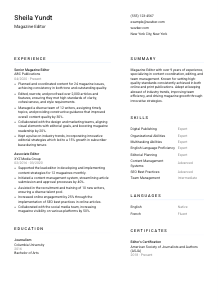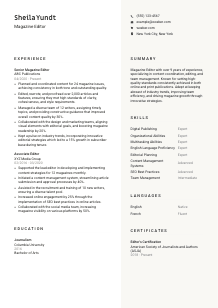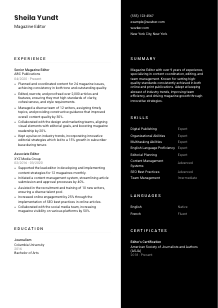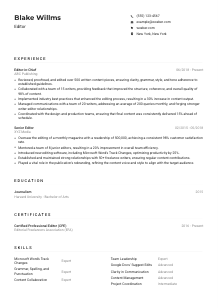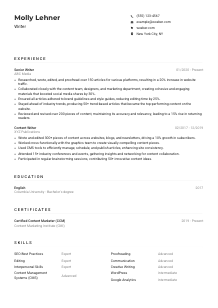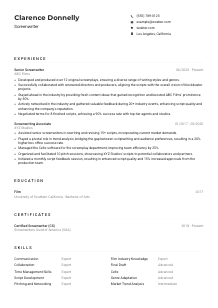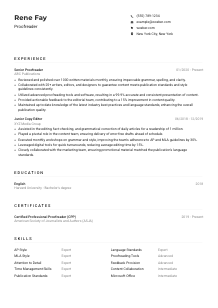Magazine Editor Resume Example
Curating prose, but your resume won't make headlines? Delve into this Magazine Editor resume example, penned with Wozber free resume builder. You'll see how artfully you can lay out your editorial journey to meet the dynamic standards of the publishing realm.
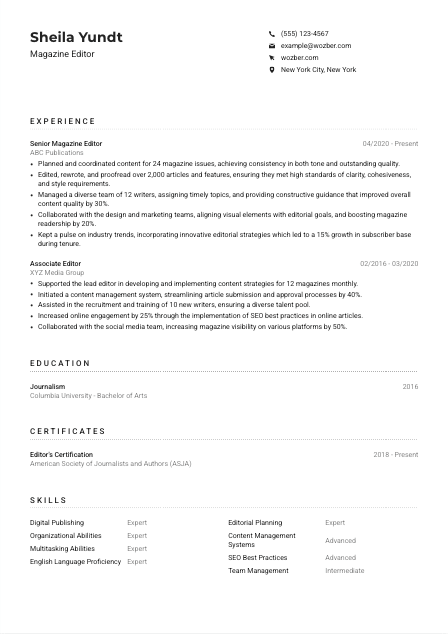
How to write a Magazine Editor Resume?
Greetings, aspirant of the Magazine Editor throne! In the realm of publishing, where every comma and every headline counts, your resume is not just paper – it's heraldry bearing your professional saga. Utilizing the prowess of the Wozber free resume builder, this guide will navigate through crafting a resume so tailored, it feels as though the job was created just for you.
Ready to assert your editorial dominance? Follow me into the world of articulate resume crafting designed for the Magazine Editor role.
Personal Details
First impressions in the publishing world begin with your resume's Personal Details section. Here, we intricately design the opening notes of your professional magnum opus, ensuring each element harmonizes with the 'Magazine Editor' role you're eyeing.
1. Your Name - The Headline
Your name is the banner under which your professional achievements march. Guarantee it's prominently placed and easily readable, like the masthead of your favorite publication.
2. Aligning With The Editorial Role
Directly below your name, clarify your aspiration by stating 'Magazine Editor' - the role you're daring to claim. This direct approach immediately aligns your professional brand with the opportunity.
3. Vital Contact Details
Ensure your contact details are as meticulous as your editorial eye. A precise phone number and a professional email (think firstname.lastname@domain.com) are your basic signals to the recruiter that you're accessible and professional.
4. A Shoutout To Your Locale
Given that our role demands you be located in 'New York City, New York', stating this upfront meets a crucial requirement, subtly whispering to the hiring manager, 'I'm already where you need me to be.'
5. Digital Persona
In today's digital-first world, including a link to a professional profile or portfolio website can set you apart. It's a window allowing potential employers to peep into your professional universe before the actual interview.
Takeaway
Consider the Personal Details section a meticulously typeset introduction in your magazine's leading editorial. It's clean, precise, and perfectly positioned to draw the reader - in this case, your future employer - into your professional narrative.





Experience
Your Experience section is where your career narrative unfolds, showcasing the editorial campaigns you've led, the content terrains you've explored, and the publishing victories you've clinched.
- Planned and coordinated content for 24 magazine issues, achieving consistency in both tone and outstanding quality.
- Edited, rewrote, and proofread over 2,000 articles and features, ensuring they met high standards of clarity, cohesiveness, and style requirements.
- Managed a diverse team of 12 writers, assigning timely topics, and providing constructive guidance that improved overall content quality by 30%.
- Collaborated with the design and marketing teams, aligning visual elements with editorial goals, and boosting magazine readership by 20%.
- Kept a pulse on industry trends, incorporating innovative editorial strategies which led to a 15% growth in subscriber base during tenure.
- Supported the lead editor in developing and implementing content strategies for 12 magazines monthly.
- Initiated a content management system, streamlining article submission and approval processes by 40%.
- Assisted in the recruitment and training of 10 new writers, ensuring a diverse talent pool.
- Increased online engagement by 25% through the implementation of SEO best practices in online articles.
- Collaborated with the social media team, increasing magazine visibility on various platforms by 50%.
1. Dissecting the Editorial Battlefield
Before diving in, dissect each responsibility and requirement listed in the job description. For a Magazine Editor, planning content across issues and maintaining a consistent tone and quality are battlegrounds you're already familiar with.
2. The Chronology of Your Editorial Campaigns
Lay out your professional timeline with precision, ensuring your most recent and relevant battles sit at the forefront. This section not only displays your journey but also your growth within the ranks.
3. Your Publishing Victories
Here's where your narrative shines. Detail your achievements and how they mirror the job's requirements. 'Planned and coordinated content for 24 magazine issues, achieving consistency in both tone and quality' speaks volumes of your editorial acumen.
4. The Power of Numbers
Numbers are the allies of your resume narrative, offering a quantifiable measure of your might. Impress upon the recruiter with stats like 'boosted magazine readership by 20%' to demonstrate the tangible impact of your editorial strategies.
5. Relevancy is Key
In the world of content, not everything written makes the cut. Similarly, ensure every experience listed directly contributes to the storyline of you being the perfect fit for the 'Magazine Editor' role.
Takeaway
The Experience section is your saga, laden with editorial conquests and content triumphs. It's a testament to your readiness to take on the 'Magazine Editor' mantle. Tailor it with care, champion your achievements, and you're on your way to crafting a narrative that captivates.
Education
While the battleground of experience shapes a Magazine Editor, the fortress of education is where the arsenal is forged. Let's curate your educational background to complement your resume's storyline perfectly.
1. Highlighting Your Editorial Foundation
Identify and list the cornerstone of your career - in this instance, 'Bachelor's degree in Journalism, Communications, or a related field' from Columbia University, strategically matching the job requirements.
2. The Structure of Your Educational Narrative
Keep this section as crisp as a well-edited article. State your degree, followed by the field of study, the issuing institution, and the graduation year. Clarity is king.
3. Tailoring Educational Achievements
If your career's prologue features a degree precisely aligning with the job's ask, like the 'Bachelor of Arts in Journalism', ensure it's highlighted. This direct correlation subtly reinforces your candidacy's strength.
4. Coursework That Complements
In some niches within the publishing world, listing relevant courses could bolster your educational narrative. For a seasoned role like Magazine Editor, however, the broader degree typically suffices.
5. Additional Educational Laurels
For roles steeped in experience, like Magazine Editor, beyond-the-basics educational achievements might be less focal. Yet, never underestimate the power of relevant awards or honors in adding depth to your educational saga.
Takeaway
The Education section is not merely a list; it's the bedrock of your editorial prowess. Crafted with intent, it supports your narrative, showcasing the academic journey that has equipped you with the tools of the trade. Let it shine, reflecting the depth of your knowledge and ambition.
Certificates
In the continuous quest for professional development, certificates are like the medals adorning the uniform of a seasoned Magazine Editor. They speak of your dedication, specialized skills, and the constant pursuit of excellence.
1. Sifting Through the Editorial Arsenal
When including certificates, start by zeroing in on those that resonate most pointedly with your targeted role. For a Magazine Editor, an 'Editor's Certification' from the American Society of Journalists and Authors is a beacon of your commitment.
2. Handpicking Your Distinctions
Select certifications that underscore your editorial expertise and knowledge of the publishing industry, always favoring quality over quantity to ensure each listed accolade truly enhances your resume's narrative.
3. Marking the Milestones
Dates matter, especially in showcasing recent or ongoing certifications, signaling to hiring managers your continuous growth and up-to-date knowledge, particularly crucial in the fast-evolving digital publishing landscape.
4. Committing to Lifelong Learning
The world of magazine publishing doesn't stand still, and neither should you. Regularly seek out new learning opportunities that align with your career path, demonstrating your evolving capabilities in the ever-changing world of editorial work.
Takeaway
Let your certificates narrate a story of relentless pursuit and professional refinement. They are not merely additions to your resume, but affirmations of your expertise and an unwavering commitment to being at the forefront of the editorial sphere.
Skills
Every Magazine Editor is as good as their toolbox. In this section, we'll sort through your arsenal of skills, strategically selecting and showcasing those that make you the quintessential candidate for the editorial crown.
1. Unpacking the Job Requirements
Dive deep into the job description to unearth both the stated and inferred skills necessary. With requirements like 'Digital Publishing' and 'SEO Best Practices', your resume needs to reflect these competencies explicitly.
2. Curating Your Editorial Skill Set
Align your skills with the job's demands, prioritizing them from 'Expert' in 'Digital Publishing' to 'Advanced' in 'Content Management Systems' and 'SEO Best Practices', showcasing your broad and relevant proficiency.
3. Organizational Symmetry
While the temptation to list every skill you own might be strong, restraint is key. A crisply organized skills section, much like a well-curated magazine layout, highlights your most relevant competencies without overwhelming the reader.
Takeaway
Think of your Skills section as the carefully chosen color palette for your next magazine issue - each one chosen for its ability to complement the overall vision. Display your skills confidently, affirming to the hiring manager that you possess the exact toolkit needed to lend their magazine the edge it seeks.
Languages
In the global village of magazine publishing, linguistic prowess can be a significant asset. This section deciphers how to strategically display your language abilities, positioning you as an editor with an international outlook.
1. Evaluating the Linguistic Demands
First, assess if the Magazine Editor role explicitly requires or prefers certain languages. In this instance, 'a strong command of English with exceptional writing and editing skills' is non-negotiable, making your native or fluent proficiency in English crucial.
2. Accentuating Key Languages
Prioritize listing languages pivotal to the role, starting with English. If you're fluent in additional languages like French, presenting this fluency can underscore your versatility and global editorial perspective.
3. Showcasing Your Linguistic Library
Beyond the mandatory, include any additional languages you're proficient in. Each language is a key to a new market or audience, a fact that won't be lost on prospective employers scanning your resume for global appeal.
4. Honest Proficiency Ratings
Clarity regarding your language proficiency levels is crucial – it sets realistic expectations and showcases your integrity. Whether 'Native', 'Fluent', or 'Intermediate', be candid about your capabilities.
5. Considering the Editorial Expanse
For roles with an international lens or those destined for multilingual audiences, your language skills become increasingly significant. Though not highlighted in this specific job description, always weigh the broader scope of the role when listing languages.
Takeaway
Your command over languages isn't just about communication; it's about connecting cultures, knitting narratives across geographies, and broadening the reach of your content. Embrace your linguistic abilities as integral to your role as a Magazine Editor, showing potential employers you're ready to lead in a global editorial arena.
Summary
In the bustling newsroom that is the job market, your Summary is the lead of your front-page story. Let's craft a compelling intro that grabs attention, making the hiring manager eager to read on.
1. Grasping the Editorial Essence
First, absorb the soul of the Magazine Editor role, understanding the blend of creativity, leadership, and strategic insight it demands. Your summary should reflect this understanding, setting the tone for your resume.
2. An Engaging Introduction
Begin with a hook - an opening line that positions you firmly within your chosen field. 'Magazine Editor with over 9 years of experience' offers a strong, confident entry point into your professional narrative.
3. Meeting Key Criteria Head-On
Your summary isn't just fluff; it's strategic. Highlight your expertise in 'content coordination, editing, and team management', directly addressing the key responsibilities and requirements from the job listing.
4. Brevity is the Soul of Wit
Remember Shakespeare's advice: keep it concise. Your summary is just the teaser, compelling the hiring manager to dive deeper into the narrative of your resume. Aim for a potent mix of precision and impact in those first few lines.
Takeaway
Your summary is not just an introduction; it's your pitch, your headline, and your value proposition, all rolled into one. Craft it with the finesse of a seasoned Magazine Editor, and you'll set the stage for a resume that not only meets expectations but exceeds them.
Embarking On Your Editorial Adventure
Congratulations, you've navigated through the art and science of crafting an ATS-compliant resume tailored for a Magazine Editor position. Armed with these insights and the powerful tools provided by the Wozber free resume builder, including ATS-friendly resume templates and an ATS resume scanner, you're equipped to embark on your job-seeking adventure. Remember, your resume is your narrative - make it compelling, make it true, and most importantly, make it yours.
The publishing world awaits your unique editorial vision. Let's turn the page to your next chapter.

- Bachelor's degree in Journalism, Communications, or a related field.
- Proven editorial experience, with at least 5 years in a senior editing role.
- Strong command of the English language with exceptional writing and editing skills.
- Proficiency in content management systems and experience with digital publishing and SEO best practices.
- Outstanding organizational and multitasking abilities with an eye for detail.
- Must be located in New York City, New York.
- Plan and coordinate content for multiple magazine issues, ensuring consistency in tone and quality.
- Edit, rewrite, and proofread content to meet standards of clarity, cohesiveness, and style.
- Manage a team of writers, assigning topics, and providing guidance and feedback.
- Collaborate with the design and marketing teams to ensure visual and promotional alignment with editorial goals.
- Keep updated on industry trends, reader preferences, and adjust editorial strategies accordingly.





